Annotated Bibliography: Theories in Nursing Practice and Research
VerifiedAdded on 2022/11/17
|5
|1652
|143
Annotated Bibliography
AI Summary
This annotated bibliography examines four scholarly journal articles related to nursing theories and their applications in healthcare. The first two articles focus on various learning theories in nursing education and the importance of theory-guided practice, highlighting the significance of nursing theories in guiding nurses' actions and establishing beliefs. The next article explores the impact of behavior theories on nursing practice, emphasizing the role of behavior in patient health and the need for understanding patient behavior for effective interventions. The final article discusses the use of non-nursing theories, specifically Maslow's need theory, in clinical practice. Each entry includes a proper APA citation, a 250-300 word annotation with summaries, assessments, and reflections on the articles. The assignment demonstrates the ability to create an effective annotated bibliography, summarizing the content, assessing the usefulness, and reflecting on the implications of each source for nursing practice.
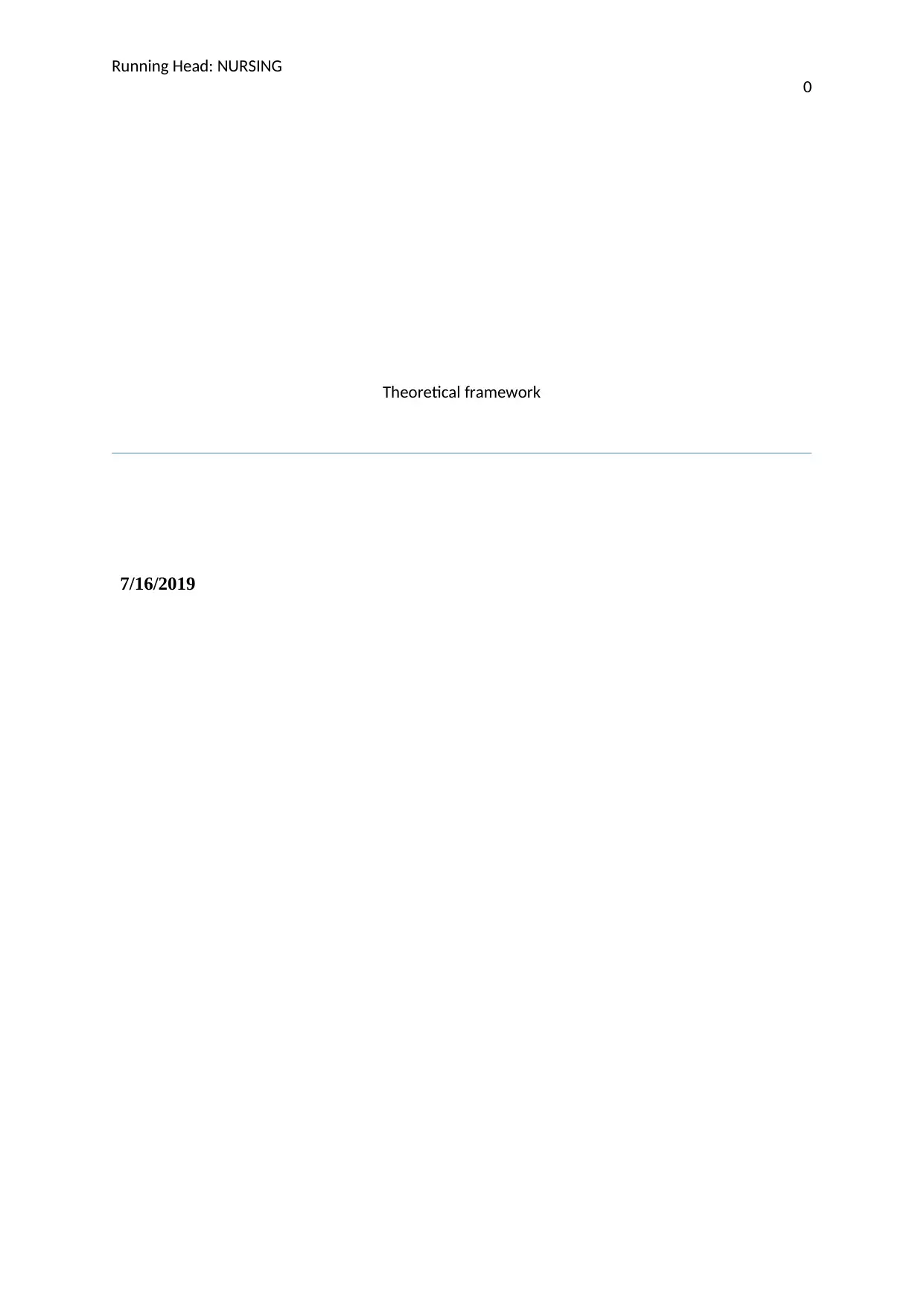
Running Head: NURSING
0
Theoretical framework
7/16/2019
0
Theoretical framework
7/16/2019
Paraphrase This Document
Need a fresh take? Get an instant paraphrase of this document with our AI Paraphraser
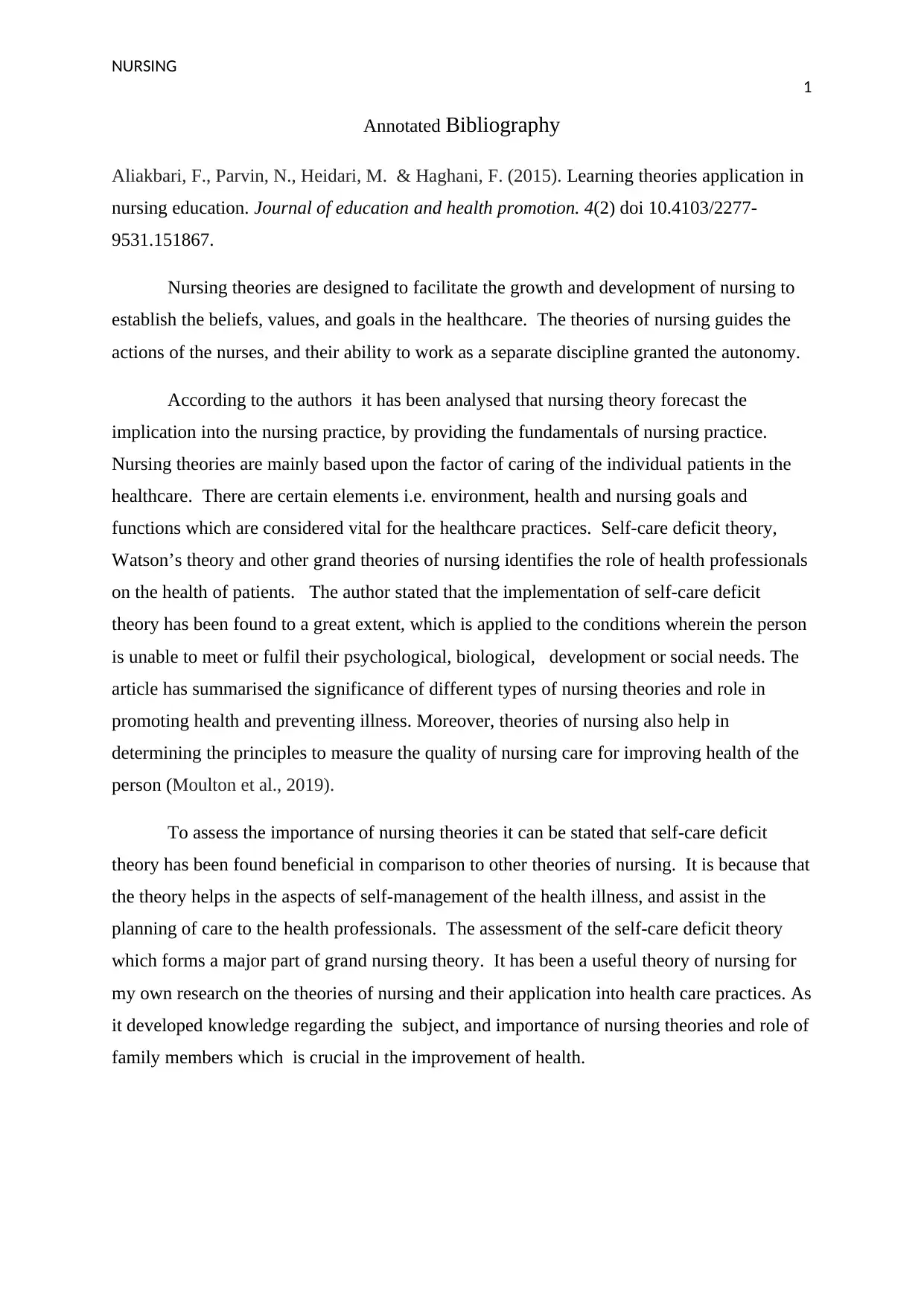
NURSING
1
Annotated Bibliography
Aliakbari, F., Parvin, N., Heidari, M. & Haghani, F. (2015). Learning theories application in
nursing education. Journal of education and health promotion. 4(2) doi 10.4103/2277-
9531.151867.
Nursing theories are designed to facilitate the growth and development of nursing to
establish the beliefs, values, and goals in the healthcare. The theories of nursing guides the
actions of the nurses, and their ability to work as a separate discipline granted the autonomy.
According to the authors it has been analysed that nursing theory forecast the
implication into the nursing practice, by providing the fundamentals of nursing practice.
Nursing theories are mainly based upon the factor of caring of the individual patients in the
healthcare. There are certain elements i.e. environment, health and nursing goals and
functions which are considered vital for the healthcare practices. Self-care deficit theory,
Watson’s theory and other grand theories of nursing identifies the role of health professionals
on the health of patients. The author stated that the implementation of self-care deficit
theory has been found to a great extent, which is applied to the conditions wherein the person
is unable to meet or fulfil their psychological, biological, development or social needs. The
article has summarised the significance of different types of nursing theories and role in
promoting health and preventing illness. Moreover, theories of nursing also help in
determining the principles to measure the quality of nursing care for improving health of the
person (Moulton et al., 2019).
To assess the importance of nursing theories it can be stated that self-care deficit
theory has been found beneficial in comparison to other theories of nursing. It is because that
the theory helps in the aspects of self-management of the health illness, and assist in the
planning of care to the health professionals. The assessment of the self-care deficit theory
which forms a major part of grand nursing theory. It has been a useful theory of nursing for
my own research on the theories of nursing and their application into health care practices. As
it developed knowledge regarding the subject, and importance of nursing theories and role of
family members which is crucial in the improvement of health.
1
Annotated Bibliography
Aliakbari, F., Parvin, N., Heidari, M. & Haghani, F. (2015). Learning theories application in
nursing education. Journal of education and health promotion. 4(2) doi 10.4103/2277-
9531.151867.
Nursing theories are designed to facilitate the growth and development of nursing to
establish the beliefs, values, and goals in the healthcare. The theories of nursing guides the
actions of the nurses, and their ability to work as a separate discipline granted the autonomy.
According to the authors it has been analysed that nursing theory forecast the
implication into the nursing practice, by providing the fundamentals of nursing practice.
Nursing theories are mainly based upon the factor of caring of the individual patients in the
healthcare. There are certain elements i.e. environment, health and nursing goals and
functions which are considered vital for the healthcare practices. Self-care deficit theory,
Watson’s theory and other grand theories of nursing identifies the role of health professionals
on the health of patients. The author stated that the implementation of self-care deficit
theory has been found to a great extent, which is applied to the conditions wherein the person
is unable to meet or fulfil their psychological, biological, development or social needs. The
article has summarised the significance of different types of nursing theories and role in
promoting health and preventing illness. Moreover, theories of nursing also help in
determining the principles to measure the quality of nursing care for improving health of the
person (Moulton et al., 2019).
To assess the importance of nursing theories it can be stated that self-care deficit
theory has been found beneficial in comparison to other theories of nursing. It is because that
the theory helps in the aspects of self-management of the health illness, and assist in the
planning of care to the health professionals. The assessment of the self-care deficit theory
which forms a major part of grand nursing theory. It has been a useful theory of nursing for
my own research on the theories of nursing and their application into health care practices. As
it developed knowledge regarding the subject, and importance of nursing theories and role of
family members which is crucial in the improvement of health.
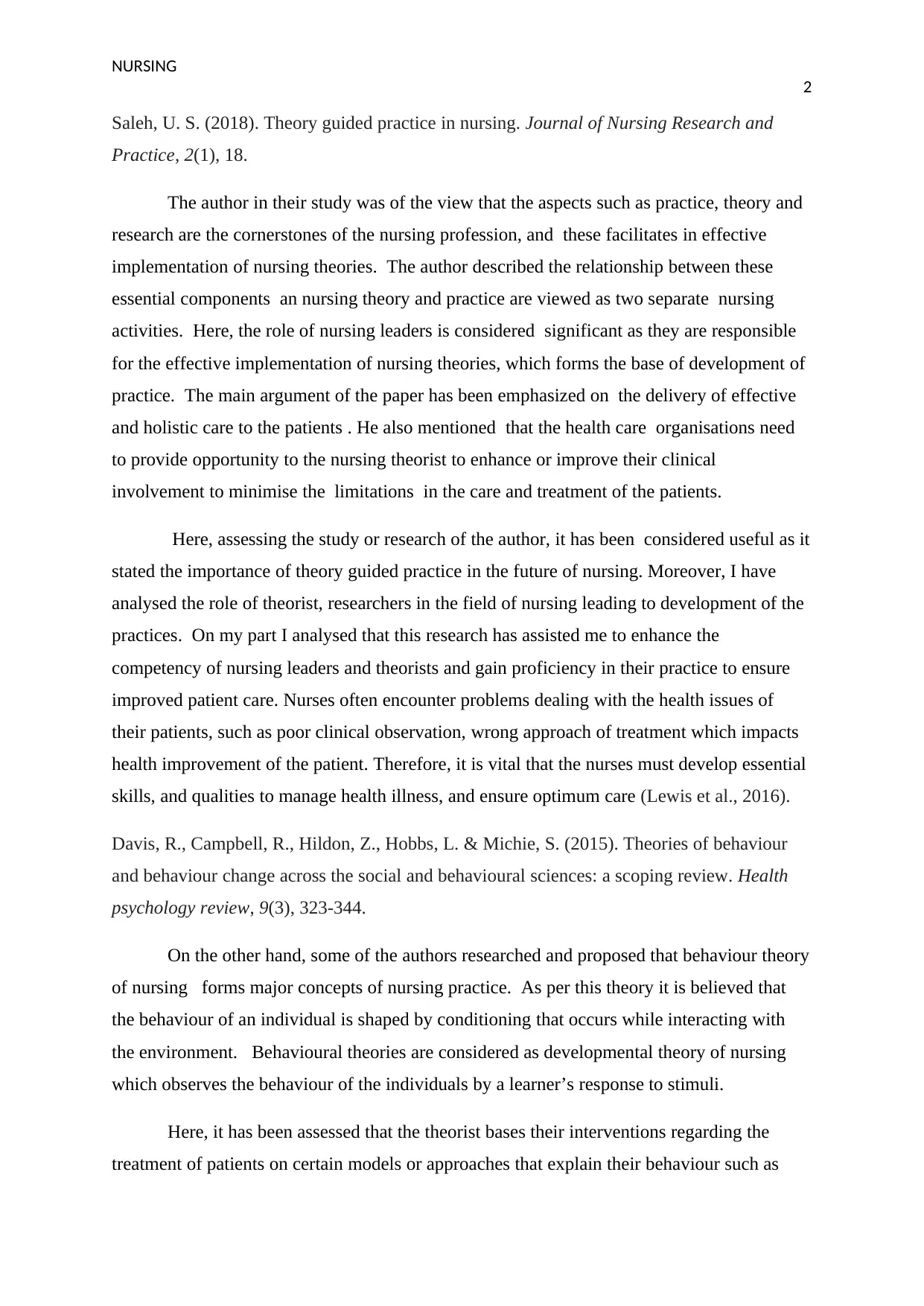
NURSING
2
Saleh, U. S. (2018). Theory guided practice in nursing. Journal of Nursing Research and
Practice, 2(1), 18.
The author in their study was of the view that the aspects such as practice, theory and
research are the cornerstones of the nursing profession, and these facilitates in effective
implementation of nursing theories. The author described the relationship between these
essential components an nursing theory and practice are viewed as two separate nursing
activities. Here, the role of nursing leaders is considered significant as they are responsible
for the effective implementation of nursing theories, which forms the base of development of
practice. The main argument of the paper has been emphasized on the delivery of effective
and holistic care to the patients . He also mentioned that the health care organisations need
to provide opportunity to the nursing theorist to enhance or improve their clinical
involvement to minimise the limitations in the care and treatment of the patients.
Here, assessing the study or research of the author, it has been considered useful as it
stated the importance of theory guided practice in the future of nursing. Moreover, I have
analysed the role of theorist, researchers in the field of nursing leading to development of the
practices. On my part I analysed that this research has assisted me to enhance the
competency of nursing leaders and theorists and gain proficiency in their practice to ensure
improved patient care. Nurses often encounter problems dealing with the health issues of
their patients, such as poor clinical observation, wrong approach of treatment which impacts
health improvement of the patient. Therefore, it is vital that the nurses must develop essential
skills, and qualities to manage health illness, and ensure optimum care (Lewis et al., 2016).
Davis, R., Campbell, R., Hildon, Z., Hobbs, L. & Michie, S. (2015). Theories of behaviour
and behaviour change across the social and behavioural sciences: a scoping review. Health
psychology review, 9(3), 323-344.
On the other hand, some of the authors researched and proposed that behaviour theory
of nursing forms major concepts of nursing practice. As per this theory it is believed that
the behaviour of an individual is shaped by conditioning that occurs while interacting with
the environment. Behavioural theories are considered as developmental theory of nursing
which observes the behaviour of the individuals by a learner’s response to stimuli.
Here, it has been assessed that the theorist bases their interventions regarding the
treatment of patients on certain models or approaches that explain their behaviour such as
2
Saleh, U. S. (2018). Theory guided practice in nursing. Journal of Nursing Research and
Practice, 2(1), 18.
The author in their study was of the view that the aspects such as practice, theory and
research are the cornerstones of the nursing profession, and these facilitates in effective
implementation of nursing theories. The author described the relationship between these
essential components an nursing theory and practice are viewed as two separate nursing
activities. Here, the role of nursing leaders is considered significant as they are responsible
for the effective implementation of nursing theories, which forms the base of development of
practice. The main argument of the paper has been emphasized on the delivery of effective
and holistic care to the patients . He also mentioned that the health care organisations need
to provide opportunity to the nursing theorist to enhance or improve their clinical
involvement to minimise the limitations in the care and treatment of the patients.
Here, assessing the study or research of the author, it has been considered useful as it
stated the importance of theory guided practice in the future of nursing. Moreover, I have
analysed the role of theorist, researchers in the field of nursing leading to development of the
practices. On my part I analysed that this research has assisted me to enhance the
competency of nursing leaders and theorists and gain proficiency in their practice to ensure
improved patient care. Nurses often encounter problems dealing with the health issues of
their patients, such as poor clinical observation, wrong approach of treatment which impacts
health improvement of the patient. Therefore, it is vital that the nurses must develop essential
skills, and qualities to manage health illness, and ensure optimum care (Lewis et al., 2016).
Davis, R., Campbell, R., Hildon, Z., Hobbs, L. & Michie, S. (2015). Theories of behaviour
and behaviour change across the social and behavioural sciences: a scoping review. Health
psychology review, 9(3), 323-344.
On the other hand, some of the authors researched and proposed that behaviour theory
of nursing forms major concepts of nursing practice. As per this theory it is believed that
the behaviour of an individual is shaped by conditioning that occurs while interacting with
the environment. Behavioural theories are considered as developmental theory of nursing
which observes the behaviour of the individuals by a learner’s response to stimuli.
Here, it has been assessed that the theorist bases their interventions regarding the
treatment of patients on certain models or approaches that explain their behaviour such as
⊘ This is a preview!⊘
Do you want full access?
Subscribe today to unlock all pages.

Trusted by 1+ million students worldwide
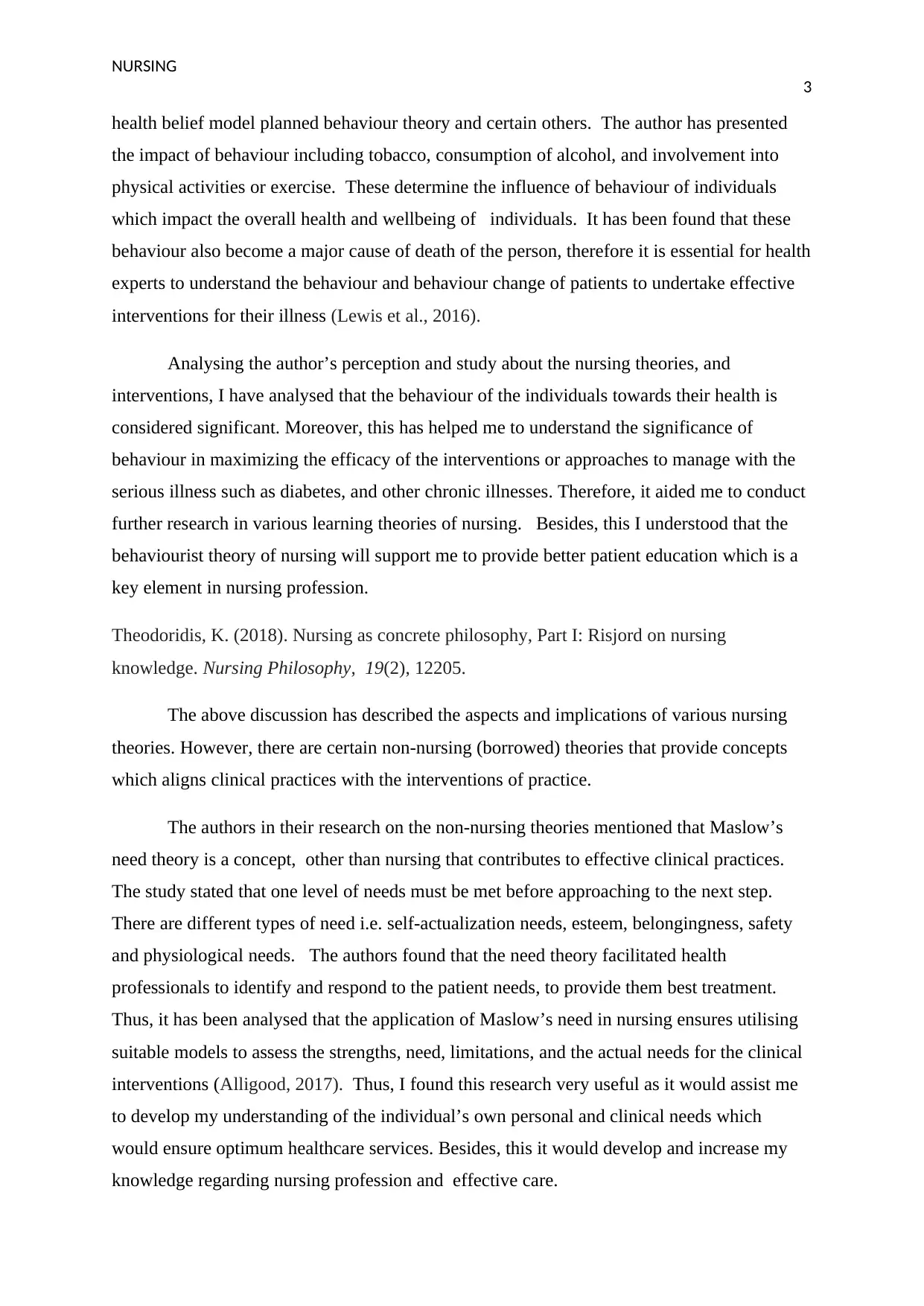
NURSING
3
health belief model planned behaviour theory and certain others. The author has presented
the impact of behaviour including tobacco, consumption of alcohol, and involvement into
physical activities or exercise. These determine the influence of behaviour of individuals
which impact the overall health and wellbeing of individuals. It has been found that these
behaviour also become a major cause of death of the person, therefore it is essential for health
experts to understand the behaviour and behaviour change of patients to undertake effective
interventions for their illness (Lewis et al., 2016).
Analysing the author’s perception and study about the nursing theories, and
interventions, I have analysed that the behaviour of the individuals towards their health is
considered significant. Moreover, this has helped me to understand the significance of
behaviour in maximizing the efficacy of the interventions or approaches to manage with the
serious illness such as diabetes, and other chronic illnesses. Therefore, it aided me to conduct
further research in various learning theories of nursing. Besides, this I understood that the
behaviourist theory of nursing will support me to provide better patient education which is a
key element in nursing profession.
Theodoridis, K. (2018). Nursing as concrete philosophy, Part I: Risjord on nursing
knowledge. Nursing Philosophy, 19(2), 12205.
The above discussion has described the aspects and implications of various nursing
theories. However, there are certain non-nursing (borrowed) theories that provide concepts
which aligns clinical practices with the interventions of practice.
The authors in their research on the non-nursing theories mentioned that Maslow’s
need theory is a concept, other than nursing that contributes to effective clinical practices.
The study stated that one level of needs must be met before approaching to the next step.
There are different types of need i.e. self-actualization needs, esteem, belongingness, safety
and physiological needs. The authors found that the need theory facilitated health
professionals to identify and respond to the patient needs, to provide them best treatment.
Thus, it has been analysed that the application of Maslow’s need in nursing ensures utilising
suitable models to assess the strengths, need, limitations, and the actual needs for the clinical
interventions (Alligood, 2017). Thus, I found this research very useful as it would assist me
to develop my understanding of the individual’s own personal and clinical needs which
would ensure optimum healthcare services. Besides, this it would develop and increase my
knowledge regarding nursing profession and effective care.
3
health belief model planned behaviour theory and certain others. The author has presented
the impact of behaviour including tobacco, consumption of alcohol, and involvement into
physical activities or exercise. These determine the influence of behaviour of individuals
which impact the overall health and wellbeing of individuals. It has been found that these
behaviour also become a major cause of death of the person, therefore it is essential for health
experts to understand the behaviour and behaviour change of patients to undertake effective
interventions for their illness (Lewis et al., 2016).
Analysing the author’s perception and study about the nursing theories, and
interventions, I have analysed that the behaviour of the individuals towards their health is
considered significant. Moreover, this has helped me to understand the significance of
behaviour in maximizing the efficacy of the interventions or approaches to manage with the
serious illness such as diabetes, and other chronic illnesses. Therefore, it aided me to conduct
further research in various learning theories of nursing. Besides, this I understood that the
behaviourist theory of nursing will support me to provide better patient education which is a
key element in nursing profession.
Theodoridis, K. (2018). Nursing as concrete philosophy, Part I: Risjord on nursing
knowledge. Nursing Philosophy, 19(2), 12205.
The above discussion has described the aspects and implications of various nursing
theories. However, there are certain non-nursing (borrowed) theories that provide concepts
which aligns clinical practices with the interventions of practice.
The authors in their research on the non-nursing theories mentioned that Maslow’s
need theory is a concept, other than nursing that contributes to effective clinical practices.
The study stated that one level of needs must be met before approaching to the next step.
There are different types of need i.e. self-actualization needs, esteem, belongingness, safety
and physiological needs. The authors found that the need theory facilitated health
professionals to identify and respond to the patient needs, to provide them best treatment.
Thus, it has been analysed that the application of Maslow’s need in nursing ensures utilising
suitable models to assess the strengths, need, limitations, and the actual needs for the clinical
interventions (Alligood, 2017). Thus, I found this research very useful as it would assist me
to develop my understanding of the individual’s own personal and clinical needs which
would ensure optimum healthcare services. Besides, this it would develop and increase my
knowledge regarding nursing profession and effective care.
Paraphrase This Document
Need a fresh take? Get an instant paraphrase of this document with our AI Paraphraser
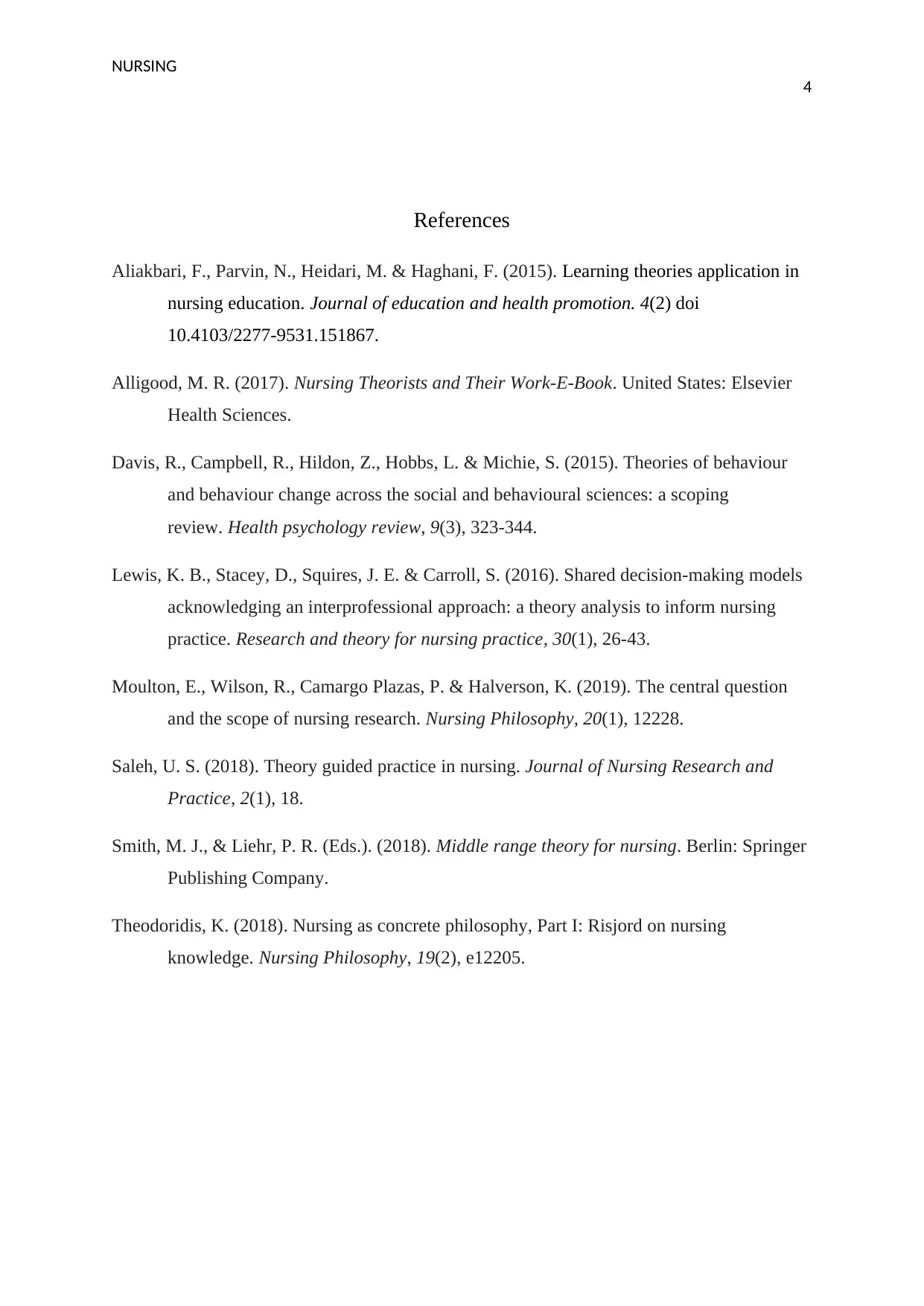
NURSING
4
References
Aliakbari, F., Parvin, N., Heidari, M. & Haghani, F. (2015). Learning theories application in
nursing education. Journal of education and health promotion. 4(2) doi
10.4103/2277-9531.151867.
Alligood, M. R. (2017). Nursing Theorists and Their Work-E-Book. United States: Elsevier
Health Sciences.
Davis, R., Campbell, R., Hildon, Z., Hobbs, L. & Michie, S. (2015). Theories of behaviour
and behaviour change across the social and behavioural sciences: a scoping
review. Health psychology review, 9(3), 323-344.
Lewis, K. B., Stacey, D., Squires, J. E. & Carroll, S. (2016). Shared decision-making models
acknowledging an interprofessional approach: a theory analysis to inform nursing
practice. Research and theory for nursing practice, 30(1), 26-43.
Moulton, E., Wilson, R., Camargo Plazas, P. & Halverson, K. (2019). The central question
and the scope of nursing research. Nursing Philosophy, 20(1), 12228.
Saleh, U. S. (2018). Theory guided practice in nursing. Journal of Nursing Research and
Practice, 2(1), 18.
Smith, M. J., & Liehr, P. R. (Eds.). (2018). Middle range theory for nursing. Berlin: Springer
Publishing Company.
Theodoridis, K. (2018). Nursing as concrete philosophy, Part I: Risjord on nursing
knowledge. Nursing Philosophy, 19(2), e12205.
4
References
Aliakbari, F., Parvin, N., Heidari, M. & Haghani, F. (2015). Learning theories application in
nursing education. Journal of education and health promotion. 4(2) doi
10.4103/2277-9531.151867.
Alligood, M. R. (2017). Nursing Theorists and Their Work-E-Book. United States: Elsevier
Health Sciences.
Davis, R., Campbell, R., Hildon, Z., Hobbs, L. & Michie, S. (2015). Theories of behaviour
and behaviour change across the social and behavioural sciences: a scoping
review. Health psychology review, 9(3), 323-344.
Lewis, K. B., Stacey, D., Squires, J. E. & Carroll, S. (2016). Shared decision-making models
acknowledging an interprofessional approach: a theory analysis to inform nursing
practice. Research and theory for nursing practice, 30(1), 26-43.
Moulton, E., Wilson, R., Camargo Plazas, P. & Halverson, K. (2019). The central question
and the scope of nursing research. Nursing Philosophy, 20(1), 12228.
Saleh, U. S. (2018). Theory guided practice in nursing. Journal of Nursing Research and
Practice, 2(1), 18.
Smith, M. J., & Liehr, P. R. (Eds.). (2018). Middle range theory for nursing. Berlin: Springer
Publishing Company.
Theodoridis, K. (2018). Nursing as concrete philosophy, Part I: Risjord on nursing
knowledge. Nursing Philosophy, 19(2), e12205.
1 out of 5
Related Documents
Your All-in-One AI-Powered Toolkit for Academic Success.
+13062052269
info@desklib.com
Available 24*7 on WhatsApp / Email
![[object Object]](/_next/static/media/star-bottom.7253800d.svg)
Unlock your academic potential
Copyright © 2020–2026 A2Z Services. All Rights Reserved. Developed and managed by ZUCOL.





